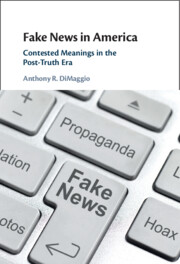Book contents
- Fake News in America
- Fake News in America
- Copyright page
- Dedication
- Contents
- Figures
- Tables
- Contributors
- Acknowledgments
- Introduction
- 1 The Age of Post-Truth Politics
- 2 The Phenomenon of Fake News, Part 1
- 3 The Phenomenon of Fake News, Part 2
- 4 The Phenomenon of Fake News, Part 3
- 5 Fake News as Propaganda
- 6 Fake News and US Foreign Policy in the Trump Era
- 7 The Intensifying Fake News Crisis in the Age of Social Media
- Conclusion
- Bibliography
- Index
7 - The Intensifying Fake News Crisis in the Age of Social Media
Published online by Cambridge University Press: 30 August 2023
- Fake News in America
- Fake News in America
- Copyright page
- Dedication
- Contents
- Figures
- Tables
- Contributors
- Acknowledgments
- Introduction
- 1 The Age of Post-Truth Politics
- 2 The Phenomenon of Fake News, Part 1
- 3 The Phenomenon of Fake News, Part 2
- 4 The Phenomenon of Fake News, Part 3
- 5 Fake News as Propaganda
- 6 Fake News and US Foreign Policy in the Trump Era
- 7 The Intensifying Fake News Crisis in the Age of Social Media
- Conclusion
- Bibliography
- Index
Summary
Chapter 7 analyzes misinformation and conspiracy theories as contemporary examples of fake news. These include the “death panels” controversy, the Obama “birther” conspiracy, Pizzagate, QAnon, and Covid-19–related myths and conspiracies. Not all conspiracy theories originate from the American right, although this chapter documents how the highest profile ones are embraced by right-wing media and the Republican Party. These conspiracies rise to prominence after being indulged by Republican officials, right-wing media outlets, and in social media. Social media increasingly serve as prime disseminators of reactionary conspiracies. I also examine how traditional “agenda setting” news media have held the line against these conspiracies, with consumption of these venues associated with increased rejection of the conspiracies. In contrast, social media consumption – in general and particularly for Republican Americans – is regularly associated with embrace of conspiracies. This rising culture of conspiratorialism has reached crisis levels with movements like QAnon, and with the Covid-19 pandemic and the failure of millions of Americans to take the crisis seriously or think about it in factual ways. In an era when traditional media gatekeepers are being pushed aside in favor of social media venues, people curate their own information and construct echo chambers, allowing conspiracy theories free reign.
Keywords
- Type
- Chapter
- Information
- Fake News in AmericaContested Meanings in the Post-Truth Era, pp. 183 - 228Publisher: Cambridge University PressPrint publication year: 2023



